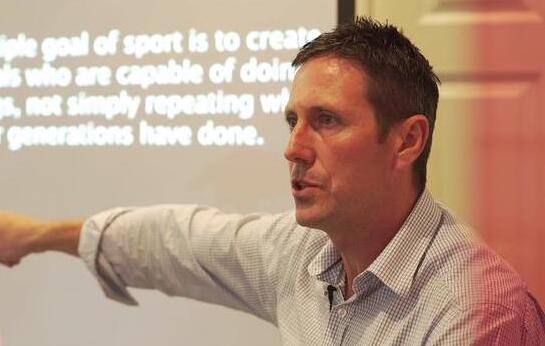
13
Tony Strudwick
Past & future of sports science
April 1, 2020
Tony Strudwick says building relationships is still the most important skill for any practitioner, despite the increasing influence of data and science in football.
The Wales and Sheffield Wednesday Head of Performance, who was part of Sir Alex Ferguson’s inner circle at Manchester United for six years, says this holds true even when players and staff are working remotely during the coronavirus crisis.
“Connecting and building relationships with an athlete is, for me, still the most important thing,” Strudwick told the TGG Podcast. “In this period now, with your athletes working from home, the first thought every day should be to send them a message ‘how are you doing?’
“Not, ‘have you hit x, y and z today?’ The soft skills side of it is really important. The modern coach is exposed to so much high-quality material, in terms of game models and sports science and so on, but you’re not just an iPad coach, you’re a human being.
“That is one of the most important things for a successful environment. The best coaches in the future will be the ones who combine the science with the art of engaging with the athletes.”
Last year, Professor Barry Drust published a paper on the past, present and future of sports science and described a culture of ’24-hour surveillance’ at some clubs.
“A good friend of mine, Barry Drust, looked at touch points between player and sports science department in a typical week,” Strudwick said. “It was 49, which is a lot of touch points.
“The first contact of the day between an athlete and fitness coach is really important. It should be good morning, engage, connect. Try and touch every player in terms of human contact.
“But what has happened is that this really important part of the day is sub-contracted to either an intern, who is very inexperienced, or the player walks in and their first contact in the training process is a laptop or iPad.
“I’m not so sure that is beneficial to building a really collective environment or that that’s the right way to go in terms of athlete engagement. That isn’t always taught on a University course, but that’s something that should be developed and shouldn’t be sub-contracted to the least experienced people in the building.
“Unfortunately, in this kind of surveillance environment that is now quite prevalent, the person who’s got the iPad first thing in the morning will often be the intern.”
Sir Alex Ferguson
Connecting with staff and players was one of Sir Alex Ferguson’s greatest strengths, Strudwick said. Of his 11 years at Manchester United, the practitioner worked as the Scot’s Head of Performance for six.
In that time United won four Premier League titles, two League Cups, the Champions League and World Club Cup.
“On my first day on the job, Sir Alex said, ‘right, the players are downstairs, go and warm them up.’ That was it. He was trusting me to do the job and trust is a force multiplier.
“If I give you trust, you don’t want to let me down. Having that kind of transparent, honest – sometimes very honest – leadership is very powerful. As Rene Meulensteen said, having fun was a big part of building that rapport.
“When we went to work, the players and staff loved going in. They didn’t want to leave the training ground. That’s a thriving high-performance environment – everybody is connected and there’s trust, autonomy and empowerment. It becomes really engaging.
“It was an authentic leadership style. That was one of his greatest strengths – his ability to connect with people. That’s quite inspirational.”
Strudwick, who has also worked for Coventry City, West Ham, Blackburn and England, said Ferguson was always open to new ideas and trusted his subject-matter experts to discover them.
“Sir Alex would always start the season by saying, ‘right, how can we get a competitive advantage?’ He empowered his team – Steve McNally, the doctor, Rob Swire, the physio – to do that.
“He constantly updated himself, he constantly recycled assistants, he constantly evolved his ideas. We first started using GPS in 2010. Much of our training model before was based on heart rate monitoring and RPE (rate of perceived effort) before that, but Australia were a little ahead of the curve on GPS and we had some guys in from the AFL and decided to give it a go.”
Strudwick said it was up to the coaches and practitioners to make information digestible, understandable and relevant for the manager.
“I wouldn’t say he always understood the numbers, but that was our job to make it contextual and intuitive for him. It’s not always blaming the coach for not understanding data and numbers – sometimes it’s our responsibility to ensure we feed it back in a way that makes sense.
“If I’d have put a 20-page report on his desk, the chances of him a) having the time to read it and b) the motivation, would have been pretty low.
“You have a window of opportunity every day, every other day, to get that quick message across. It’s knowing the people you work with and understanding what makes sense for them and how they absorb information.”